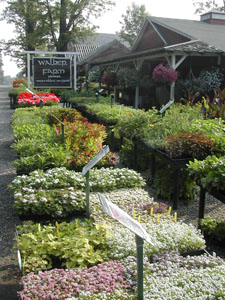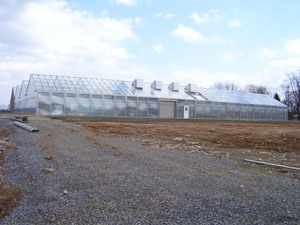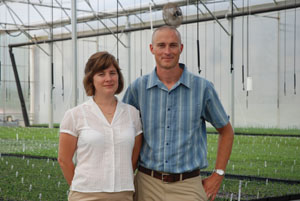12/15/2008
Up & Coming Businesses
Jennifer Duffield White
For 13 years, we’ve been identifying up-and-coming businesses—from wholesale growers to retailers—who’ve found their own formulas for success. Some command giant sales volumes; others maintain a tiny seasonal retail growing operation in a rural corner. No matter, they have figured out what works for them, and they’ve generally had the foresight to change with the times.
We honor these Up & Comers each year partly to recognize them for their efforts and partly to share their experiences with you, our readers.
Approaching 2009, though, has brought an onslaught of questions for so many businesses in our industry; it has also elicited innovative brainstorming and analysis on the state of the industry. Which is to say … this year’s list of Up & Comers has a different feel. In a sense, the nominations we received included businesses that nominators identified as being able to weather some severe storms, or as having niches that will succeed in today’s climate.
We included, for the first time ever, a breeder/researcher on that list: GardenGenetics. And then there’s Walker Farm, a plant lover’s paradise whose owners certainly struggled, like so many of you, when they first started out, but who’ve keyed in on a combination of flowers and vegetables that gave them their best year ever last year.
Down in Texas, Spring Creek Growers uses Christmas tree sales to bridge the cash-flow gap that cripples so many greenhouses each winter. And in Georgia, a vibrant couple of horticulture graduates continue to invest in their perennial liner business, James Greenhouses, looking at lean flow, among other things, to keep them on the cutting edge.
Each of these businesses is unique in its own respect, yet you’ll also find a few unifying principles—the same principles that are being reiterated over and over in the pages of this magazine as the keys to doing business in this ever-changing marketplace: efficiency, communication across the supply chain, diversity, careful variety selection and a strong identity (or, if you will, a strong story) that’s communicated to their customers.
 Walker Farm
Walker Farm
From the periphery, you might consider them a throwback of days gone by: Walker Farm’s 200-year history; its quaint location in Dummerston, Vermont; a farm stand; a sampling of odd plant varieties you’ve never seen before; a harvest dinner on the calendar; and word-of mouth advertising. Yet, those details are exactly what have built Walker Farm’s reputation and ensured their success.
When you consider the predictions that consumers are trending towards wanting a deeper relationship with the products they buy and wanting an experience, coupled with a growing eco-consciousness, Walker Farm has set itself up to deliver just that.
Jack and Karen Manix set down roots on his grandfather’s farm in 1973, growing vegetables, raising livestock and finally coming into their own as a business when they began selling flowers. Part of the success of Walker Farm as we know it today—part garden center, part farm stand—is the high density of educated gardening clientele and the luck of having a number of well-known garden writers who they’ve developed relationships with over the years, including Jamaica Kincaid and Tasha Tudor. Writers brought strange and unusual seeds for them to grow out, and their collection expanded. “Our customers feed us with what they want and we grow it,” says Jack, noting that this continued close relationship with customers is the key to their success.
They grow some 1200 varieties of annuals and perennials, plus a bounty of heirloom vegetables. Today, they produce all of their vegetables certified organic. Some are sold as vegetable bedding plants; and some are grown in the field, harvested, and sold through their farmstand—a venture that ensures customer visits right through the fall. For Walker Farm, the vegetable side has become an increasingly important to their success. The combination of the economy, food safety issues and a growing number of people striving to eat “local” has created a mini frenzy. Last year they anticipated that vegetable plant sales would go up, and they increased production accordingly. “We sold out,” says Jack. “We had the best year we’ve ever had.” In particular, they saw a huge influx in young people coming in to buy plants for their first gardens. They’ve paid special attention to this group, making sure that they set them up to be successful with good advice and educational offerings. “That’s our customer for the next 30 years,” stresses Jack.
The Manix family is also working hard to keep the younger generations happy in the workplace. Their daughter Kristin has already become an essential element to managing the retail area, and their son Dustin, while currently working for a nursery on the West Coast, expects to return to the family operation. In addition, “We have a great group of young people working for us,” explains Jack. This year, in an effort to keep them working when the rest of the farm is closed for the winter, they started a community supported agriculture (CSA) program, where customers buy shares to receive a portion of the harvest. Winter harvest? In Vermont? They’ve had success growing greens in unheated greenhouses. So for a low operation cost, they’re keeping valuable employees, giving them marketing experience and maintaining a connection to customers in the winter months. (They won’t be doing a CSA during the summer, since they have their farm stand operational then.)
As for advertising, other than letting people know they’re open, they don’t spend money on traditional print or radio ads. “We’re more into creating buzz through word of mouth and special events,” explains Jack. Giving gift certificates to charity events, for example, works as a marketing tool while conributing to the community and, “it’s working, in the long run, in maintaining our image,” they reason.
 GardenGenetics
GardenGenetics
GardenGenetics’ niche falls outside of our normal Up & Comers base of retailers and wholesale growers. However, in an economic climate that’s forcing everyone to look at the entire supply chain and evaluate varieties more closely than ever before, we felt it was apropos to include an up-and-coming breeding company on our list this year. In fact, in an era of consolidation, it’s rare to even have an upstart company of this nature.
Veteran plant breeders Mike Uchneat and Rick Grazzini came together recently to form GardenGenetics, beginning work on their 20-acre Centre County, Pennsylvania farm in the fall of 2007. Their new 20,000 sq. ft.-Nexus greenhouse became fully operational in June 2008, offering a combination of plant breeding and contract research.
This young startup still has much to prove, but they’ve developed a model to take the challenges into account. As a breeder, they’re keeping their eyes and ears open, trying to listen to what both home gardeners and the industry desires in their plants—from traditional annual and perennial crops to edible crops and even medicinals. They’re pleased to be located in the northeastern U.S., a region they think is underrepresented for testing and breeding, especially given the population density. However, as a young startup company, their genetics won’t be available for trialing and licensing for probably another two years. So, they’ve also developed a business model that allows them to offer a diversity of services. In addition to their own proprietary breeding projects, they’ll conduct what they call “rough breeding”—doing the tedious work such as early development hybridization—so that the client can focus just on the final stages of breeding themselves. Plus, GardenGenetics is staking a claim in another specialty: contract research. With an eight-zone greenhouse and ample field acreage, they offer both greenhouse and field research trials; they even give clients the option of a confidential trial area with physical/visual barriers.
“For example,” says Mike, “a company might choose us for research that their own facility can’t handle, such as a series of isolated environments at different temperatures.” Contract research acts as cash flow, and it allows them to get to know companies in the industry, explains Mike. Those relationships, down the road, will also come into play when GardenGenetics has new plant material to offer. This past fall, they grew a number of experimental and commercial poinsettia varieties under cold temperatures to help their client figure out which varieties excelled in a cooler grower regime and how it affected timing and quality. Some of the night temperatures differed by only 2 degrees, yet they found differences in variety response.
The field acreage was already maintained under organic/sustainable conditions for a decade, and Mike and Rick are devoted to managing it a sustainable manner, though they don’t plan to get a formal certification. Building the facility from the ground up, GardenGenetics paid close attention to a number of sustainability issues. They worked hard at greenhouse efficiency through structures and environmental controls, and designed workspaces and the headhouse with lots of natural light in order to cut down on the need for supplemental lighting. A retention pond captures all the runoff from the roof of the greenhouse, and a bioswale helps filter the overflow. The pond water will be used to dilute their well water and can also be used in the event of water shortages. To increase biodiversity on the property, GardenGentics will use the pond to work with aquatic and wetland plants, and they plan to place bat colony houses throughout the farm in order to help control caterpillar and beetle damage in their outdoor trial gardens. (You’ll find a lot more information on some of these efforts on their blog: http://gardengenetics.blogspot.com)
Spring Creek Growers
Bob and Carla Jones of Spring Creek Growers in Magnolia, Texas, are another example of a multi-generational farm family that has diversified to include floriculture. Carla’s grandparents bought the farm in 1921, growing produce for the Houston market. Since 1992, Bob and Carla have run the operation, mainly growing annuals and perennials for re-wholesalers, landscapers and independent garden centers in the area. However, for five weeks each November and December, their farm becomes a buzz of retail activity as they open up to the public for a cut-your-own Christmas tree business, complete with hayrides, hot cocoa and a gift shop.
“The name of the game is diversification,” says Bob. And while the tree business makes for a downright crazy run into the holidays, it’s a good influx of cash at a needed time. We should also point out that while it may be a short selling season, Spring Creek has made a name for itself in this niche, growing the Grand Champion Christmas Tree of Texas in 2001, 2002, 2006, 2007 and 2008.
With a wholesale nursery staff that numbers around 22, Spring Creek maintains two growing facilities: one in Magnolia (where the 30-acre tree nursery is, as well) and one in Waller. Their primary spring focus is 4-in. color material, with some 4.5-in. specialty items and 1-gal. perennials.
Supply chain communication is one of the attributes of Spring Creek that makes them stand out. They keep plant material fresh with the latest new varieties, and that buzz gets conveyed to customers. For instance, they’ll hold open houses at the greenhouse specifically for landscapers. And last summer, Bob ventured up to the Ball Customer Day with one of his re-wholesaler customers and she brought her best landscape customer. With the entire supply chain present, from breeder, to grower, to distributor, to end user, everyone learned more about trends and client needs as they reviewed the trial grounds, says Bob.
Like so many growing operations, Spring Creek is learning how to adjust to changing circumstances. “We’re certainly learning how to grow cold,” says Bob, noting that they can’t afford not to. “We’re trying to refine that as much as possible, trying to refine all of our processes.” They’ve recently invested in Starcom Plant Partner, as well as a website upgrade with the hope that they’ll soon be able to have online direct order and availability for their wholesale customers—an essential element if they’re going to continue to sell to tech-savvy plant buyers. They’re also evaluating new mechanization options, such as a pot nester and a tree trimmer, that can improve efficiency.
“Right now, my plan for 2009 has a small increase forecasted,” says Bob. While he maintains that they’ll be cautious in regards to the economy, he also insists that if they see an opportunity, they’re going for it.
If their 2008 Christmas tree sales are any indication, things are looking up for Spring Creek Growers. Tree sales are up substantially and poinsettia sales have been strong, reports Bob. “It’s a testament to tradition, to family, to togetherness. We sell the experience here as much as we sell the Christmas tree.” He adds that top-quality products are key in this; top quality equals top dollar.
 James Greenhouses
James Greenhouses
When Ken and Leah James founded James Greenhouses in Colbert, Georgia, in 1998, they’d already done their homework, so to speak. That included degrees in horticulture from the University of Georgia, Athens, studying with renowned perennial expert Allan Armitage.
Leah and Ken describe the founding of their business as “a simple idea: to produce high-quality perennial plugs and liners for southern growers.” James Greenhouses has stuck to that plan. However, along the way, they’ve continued to grow in size. In 2007, the addition of an acre of Nexus Dual Atrium greenhouses brought them up to 70,000 sq. ft. of propagation space.
With a variety list that numbers about 300 perennials and specialty annuals, they try to keep as much of their inventory custom-grown, under contract, as possible. About 70% of sales are direct to growers, with the remaining portion going to brokerage companies. In the young plant business, timing is everything. In the beginning, says Ken, “The most difficult thing was building confidence in prospective customers that we could deliver in a timely manner.” James Greenhouses has proven timeliness as well as skilled growing—two attributes that keep customers coming back for more. “Some plants have their season where they’re happy to reproduce but they aren’t in others. You have to be able to artfully manipulate day length, light levels and temperatures,” says Ken.
Plant selection has been key for this Up & Comer; they keep their eyes wide open for potential new products and work closely with a number of companies on that front, including PlantHaven, ItSaul Plants and Blooms of Bressingham. They’re also a licensed propagator for Athens Select and Blooms of Bressingham.
They’ve kept a keen eye on technology in recent years, making sure their structures are as energy efficient as possible, developing a plan to use lean principles in their operation, and automating availability data. Under cover, you’ll find mist booms, energy curtains, under-bench hot-water heat, subirrigation, naturally ventilated houses and environmental controls.
As a small business, Leah and Ken have never hesitated to use networking to their utmost advantage. They stay heavily involved in industry associations; Ken has served on the Georgia Green Industry Association (GGIA) Board, and on the Athens Select Marketing Association board. In 2006, they were named the Distinguished Young Professionals of the Year by GGIA.